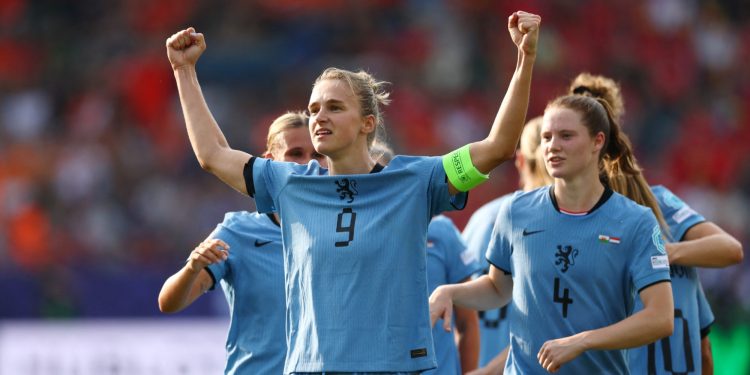The talking stops, reality hits, and the football finally commences for Wales at a major tournament.
But would emotion drive the players to compete on the biggest stage in women’s European football, or would the red wall crumble under pressure? Cover your eyes with those bucket hats, Wales fans, this may be an uncomfortable read.
If the first ten minutes were anything to go by, the highlight of the night might have ended with the anthem. And what a spine-tingling rendition it was. Welsh or not, it sent shivers down the spine.
The Dutch dominated the early stages, showing why they came in as clear favourites with experience and pedigree at this level. But as the minutes ticked on without reward for the team in blue, the women in red began to settle. Their press improved, their confidence grew, and their shape out of possession remained resolute.
The match began to fragment. Late tackles from both sides, few clear-cut chances, and a physical edge that kept the near 8,000 crowd engaged. The Netherlands offered the first real warning shot, striking the post to remind Wales of the danger.

To their credit, Wales responded by carving out a corner after a rare progressive move. It came to nothing, but it was a reminder that they weren’t here just to make up the numbers.
A word on Jess Fishlock. She squeezed every drop out of her 20 years chasing this moment. There wasn’t a battle she didn’t fight, proving that passion can sometimes outdo age and physicality. She was Wales’ heartbeat.
But matches turn on moments. Fishlock went down too easily chasing a loose ball, with no interest from the referee. And just minutes later, the inevitable arrived.
Vivianne Miedema. Artist. Assassin. Icon. Given a pocket of space, she painted her masterpiece with a composed finish curled into the top corner. The Welsh may have shown her too much respect, and Miedema, ever the magician, made them pay.
A 0–0 halftime score might’ve been fair, but football rarely obeys logic. Instead, Wales went into the break trailing, and the Dutch had their foot on the pedal.
Rhian Wilkinson brought on Ella Powell for Esther Morgan at the half, but it made no difference to the Dutch momentum. That late first-half goal had energised them, and within minutes, Wales hesitated on a ball over the top. As they watched, Pelova pounced with a calm finish for 2–0.
From there, it threatened to unravel.
The post came to Wales’ rescue again. The crossbar joined in. But fortune can only hold for so long, and Brugt’s poked volley made it three. Wales had no answers, not in defence, not in midfield, not in attack. And perhaps that’s just where they are right now. Experience at this level can’t be simulated. It has to be lived.
A disallowed goal and a few nervy moments kept the score down, but the gap in class was evident. And this match, like several others in the opening round, raised questions about competitiveness in the women’s game at tournament level. If this is to attract the neutrals, the gap between top and bottom must shrink.
With France and current champions England still to come, Wales may need to find solace in Swiss chocolate and hard lessons.
As for the Netherlands, this is a team in transition. The first half showed it. But champions know how to win even without their best rhythm. And next up? The Lionesses. Now that will be one to watch.





